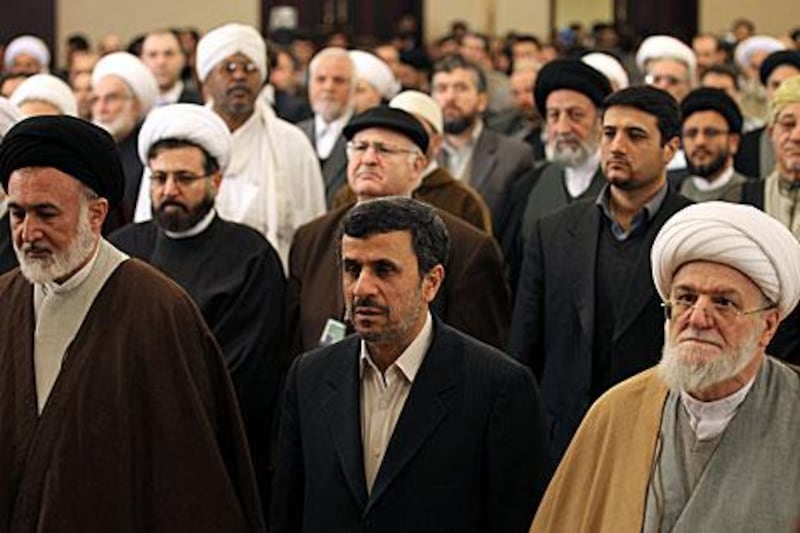TEHRAN // There's a Farsi saying used to describe an under-the-radar political effort: "Driving at night with the lights off." Allies of President Mahmoud Ahmadinejad may be doing just that as they campaign in Iran's hinterlands in hopes of scoring a comeback in next month's parliamentary elections.
The voting on March 2 should - momentarily, at least - shift attention from Iran's international standoffs over its nuclear programme back to the country's internal power plays: the ruling system striking back against perceived runaway ambitions by Mr Ahmadinejad and his inner circle.
The battles were Iran's top political spectator sport just six months ago before being eclipsed by the latest face off with the West, including tougher sanctions and widening speculation of a possible Israeli military strike on nuclear facilities.
The elections now offer Mr Ahmadinejad - who's been generally sidelined in the nuclear policymaking - a chance to reclaim some political ground after being smacked hard by Iran's supreme leader, Ayatollah Ali Khamenei, for openly challenging his authority.
Mr Ahmadinejad's supporters are favouring stealth tactics for the first nationwide vote in Iran since the chaos after the disputed presidential outcome in June 2009.
They've turned from Tehran and other big cities - and away from direct competition with rivals loyal to Ayatollah Khamenei - to focus on far-flung and poorer regions of the country. It's here that Mr Ahmadinejad can deploy his most powerful tool: access to government funds that are currently awash in Iranian rials because of an indirect benefit from sanctions.
The rial has nosedived in value while the government still brings in US dollars from oil sales. This may allow Mr Ahmadinejad's backers to make even bolder promises of handouts and other measures to ease consumer pain with prices of imported goods sharply higher as sanctions squeeze businesses.
Any new pledges would add to 450,000 rials (Dh145) a month that Ahmadinejad's government is paying to every Iranian after cutting parts of food and energy subsidies in 2010 - a significant amount for large families in impoverished areas.
A strong showing by Mr Ahmadinejad's camp would send a message of resilience to the ruling clerics after the messy political feuds. It also could rekindle Mr Ahmadinejad's hopes of getting an ally into next year's presidential race to succeed him and possibly prolong his influence as an elder statesman. Mr Ahmadinejad is in his second four-year term, the maximum under Iran's term limits.
"They are 'driving with their lights off,'" said the veteran lawmaker Hasan Ghafourifard, an Ahmadinejad critic. "But it's still not clear how much support they can get."
Even modest gains would be seen as an uptick for Mr Ahmadinejad's political fortunes. The current parliament - dominated by Ahmadinejad opponents and hard-line Ayatollah Khamenei loyalists - is bearing down hard.
On Tuesday, lawmakers said they would issue an order this week to bring Mr Ahmadinejad for questioning on alleged economic mismanagement and his spats with Ayatollah Khamenei. The summons was the first of its kind for an Iranian president since the 1979 Islamic revolution.
Mr Ahmadinejad had once been considered a favoured son of Ayatollah Khamenei, who quickly endorsed the disputed 2009 election results even as protests swelled on Tehran's streets. The ties began to fray, however, as Mr Ahmadinejad tried to expand the influence of the presidency into areas tightly controlled by the ruling theocracy, such as foreign policy and intelligence gathering.
The upcoming elections, however, pose a dilemma for the ruling system. It has the power to vet candidates and deny anyone with even a hint of pro-Ahmadinejad sentiments. But it also is desperate to avoid a low turnout, which could raise questions about national unity with western pressures intensifying.





